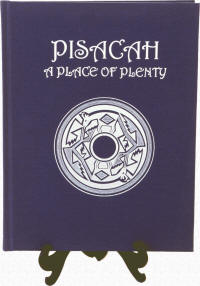Lillian Bidal
Edited by Charles and Betty Capehart
Typography, Design and Computer Graphics by Louis B. McKee
Published by the Robert E. and Evelyn McKee Foundation
Copyright © 1995
Lillian Bidal
International Standard Book Number (ISBN#): 0-9646793-0-2

Price - $32.50 - Unsigned and Unnumbered
Plus the cost of packaging and shipping.
(Limited Edition of 1,000 Copies - 200 Signed and Numbered/800 Unsigned and Unnumbered)
Also Available:
PDF eBook of the Published Book - CD Set
Price - $10.85, plus the cost of packaging and shipping.
Pisacah - A Place of Plenty
is a hard cover, 8 1/2 x 11 inch, 352 page book containing 97 photographs, eight
maps and illustrations, an appendix, end notes and index. The story begins with
a brief glimpse of the prehistoric Pueblo Indians who lived on the eastern
slopes of the Sacramento Mountains in south central New Mexico, circa 1150-1300
A.D., and centers on the lives of the people who followed them into the area.
Although the history of the Mescalero Apache Indians and the Lincoln County War
have been preserved by others, a brief summary of both have been included to set
the stage for the arrival of the homesteaders, cattle barons and sawmill
operators who were drawn to the primary water sources during the aftermath of
the Lincoln County War. The story concludes with statehood in 1912.
Water, the lack of it, the contentions over it, and the power it brought to
those in control of it, provides the focus of this narration. The book provides
an insight into how the homestead laws, water priority rights and beneficial
usage laws, water legislation enacted by the Territorial Assembly, formation of
the irrigation companies, law suits generated to settle disputed water rights
and usage, and the gradual erosion the open range policy, affected the lives of
those who struggled to make a life for themselves in a land where water was, and
continues to be, in short supply.
In writing this book the author has utilized memoirs written by her
grandmother, Angie Cleve, random notes and records kept by her grandfather,
Urban Bernard Cleve, and other family members, newspaper clippings and taped
interviews with descendants of the participants portrayed. Civic officials,
public records, and numerous books also contributed to the information
presented.
Angie Hendrix Cleve moved into the Peñasco Valley with her family in 1887 at
the age of eleven, married at seventeen and was widowed at thirty five. After
the untimely death of her husband in 1913, she managed her family’s C X Ranch,
Cottonwood Farm and Elk Store. She was appointed deputy game warden for her
area, served as a charter member of the governing board of the local Rural
Electrical Association for ten years, and acted as the postmistress of the Elk
Post Office for thirty-three years. Her brother-in-law, Thomas C. Tillotson was
one of the original homesteaders. Her husband, Urban Bernard Cleve, arrived in
1885 to work for the Champion Cattle Company on their Peñasco Valley Ranch. His
cousin, James Fielding Hinkle, became the president of the cattle company during
the late 1890’s, mayor of Roswell, New Mexico in 1905, and was elected
governor of the state in 1923.
Orders will be received in writing at the foundation office at 5835 Cromo
Drive, Suite 1, E1 Paso, Texas, 79912-5501 (P. O. Box 220599, E1 Paso, Texas
79913-2599) or by - Phone (915) 581-4025; Fax (915) 833-3714 and E-mail. Books
will also be available at Barnes & Noble in El Paso, Texas or by special
order. Any profits which may be derived from the sale of this book will
become assets of the Foundation.